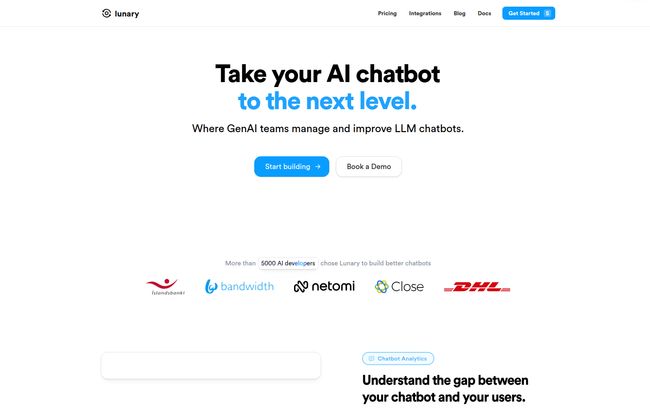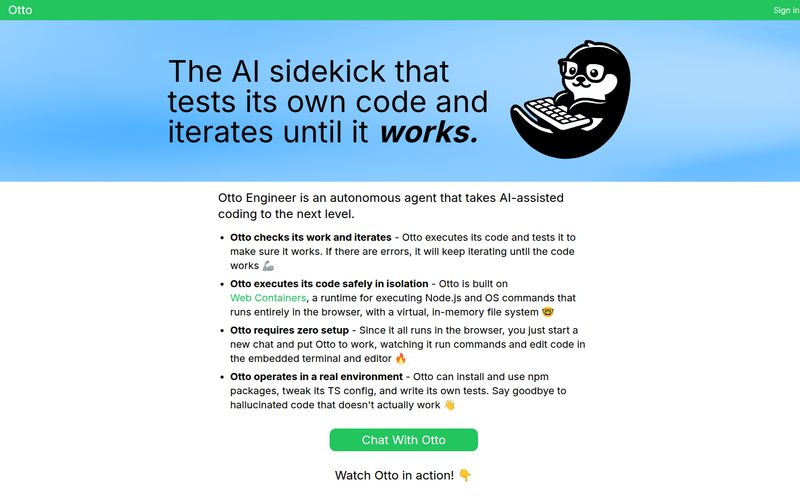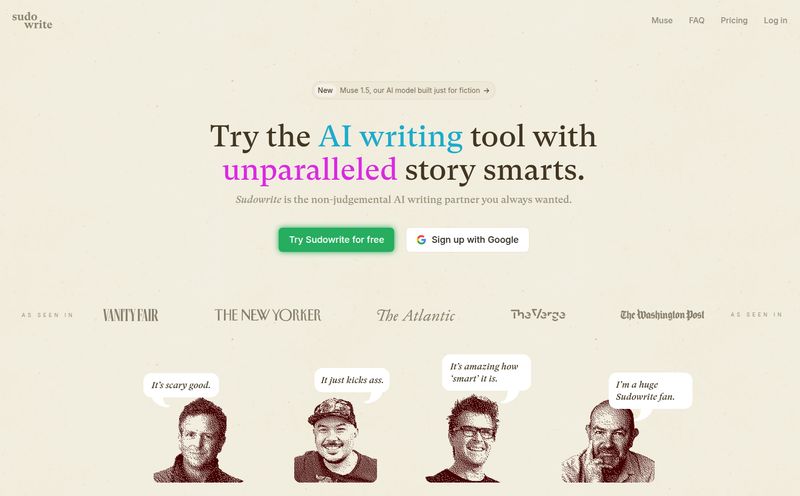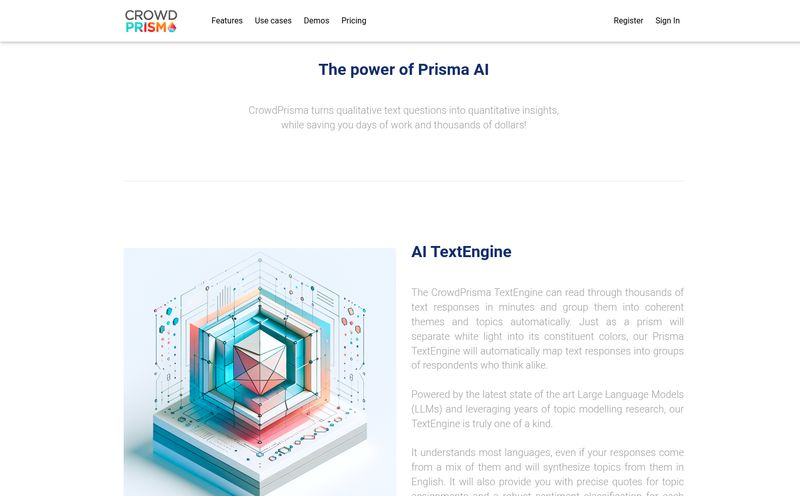Building with Large Language Models is… chaotic. One minute you have a brilliant chatbot that can debate the nuances of ancient philosophy, and the next it’s confidently telling a user that the best way to make toast is by using a hairdryer. We've all been there. Staring at a log file, trying to trace the ghost in the machine. It often feels like we're working with a magical, yet frustratingly opaque, black box.
For years, the developer world has had sophisticated observability tools. Think Datadog or New Relic for traditional software. But for AI, and specifically LLMs? We've been making do with `print()` statements and a whole lot of hope. That’s why when I stumbled across Lunary, I felt that familiar spark of excitement. An open-source platform designed specifically for the wild west of AI development? Count me in.
What Exactly is Lunary? (And Why Should You Care?)
At its core, Lunary is an observability and evaluation toolkit for anyone building apps with LLMs. Think of it as a flight data recorder for your AI. It logs, tracks, and analyzes everything that happens between your user, your application, and the language model. No more guessing why a specific interaction went off the rails. You can see the entire chain of events—the prompts, the agent's internal monologue, the final output, and even the associated costs.

Visit Lunary
But the real kicker, for me at least, is that it’s open-source. This isn’t just another SaaS tool looking to lock you into its ecosystem. It’s a platform you can self-host, giving you complete control over your data. For any company dealing with sensitive information, that's not just a feature; it's a necessity. It’s a powerful statement in an industry that's becoming increasingly centralized around a few major players. It gives the power back to the developers, and I'm all for that.
Cracking Open the Black Box: My Favorite Lunary Features
Okay, so it helps you see what's going on. But how? Let's get into the nitty-gritty. I’ve been playing around with it for a bit, and a few features really stand out as solving some of my biggest headaches.
The Analytics and Debugging Dashboard
This is the command center. Lunary provides a clean, intuitive dashboard that makes tracing complex agent interactions surprisingly simple. You can see how different parts of your system are performing, track token usage (and the costs!), and monitor user feedback in one place. I remember one project where I spent an entire afternoon trying to figure out why my agent's API calls were failing intermittently. With a tool like this, I could have spotted the malformed request in minutes. Its a genuine time-saver.
Iterating on Prompts Without Going Insane
Prompt engineering feels more like an art than a science sometimes, doesn't it? You tweak a word here, rephrase a sentence there, and pray for a better result. Lunary brings some much-needed science to the process. It includes a 'Playground' where you can test different prompt templates and compare their outputs side-by-side. You can see how changes affect the model’s response, latency, and cost. This moves you from guessing to making data-driven decisions about your prompts, which is absolutely critical for building a reliable product.
Enterprise-Grade Security (Even for the Little Guys)
This one is huge. One of the biggest hurdles to using LLMs in a production environment is data privacy. You can't just send your users' personal information off to a third-party API. Lunary tackles this head-on with built-in PII Masking. It automatically identifies and redacts sensitive data like names, emails, and phone numbers from your logs. For larger organizations, features like Role-Based Access Control (RBAC) and Single Sign-On (SSO) are available, providing the kind of security and compliance that makes the C-suite sleep better at night.
The Open Source Advantage: Self-Hosting and Control
I mentioned this before, but it deserves its own section. The fact that you can grab the Lunary source code from GitHub and host it on your own infrastructure is a massive win. Why? Data sovereignty. Your logs, your user interactions, your proprietary prompts—they all stay within your four walls (digital or otherwise). You’re not beholden to a third-party’s uptime or their sudden pricing changes.
Now, some might argue that self-hosting is a hassle. And they're not wrong. It does require some technical expertise to set up and maintain. You'll need to manage your own database and server infrastructure. But for teams that value control and security above all else, this isn't a bug; it's the main feature. Lunary also offers a managed cloud version, so you can start there and migrate to self-hosting later if you need to. It's the best of both worlds.
Let's Talk Money: Lunary's Pricing Tiers
Alright, the all-important question: what's this going to cost me? The pricing structure is refreshingly straightforward and, in my opinion, very fair. They’ve clearly thought about the entire spectrum of developers, from solo hobbyists to massive corporations.
| Plan | Price | Best For |
|---|---|---|
| Free | $0 | Personal projects and getting started. Includes 10k events/month and 30-day data retention. |
| Team | $20 / user / month | Startups and teams scaling their projects. Bumps you up to 50k events/month and unlimited seats. |
| Enterprise | Custom | Larger organizations needing advanced features like self-hosting, SSO, RBAC, and dedicated support. |
Honestly, the value here is pretty impressive. A free plan that's genuinely useful for small projects is always a great sign. The Team plan is priced very competitively, especially since it includes unlimited seats. It encourages collaboration rather than penalizing you for growing your team.
Who is Lunary Really For?
After digging in, I see a few key groups who would get a ton of value out of Lunary.
- The Solo Developer: If you're tinkering with a new AI idea on the weekend, the free plan is your best friend. It gives you professional-grade tools without asking for a credit card.
- The AI Startup: For startups building an LLM-powered product, the Team plan is the sweet spot. It provides the observability and collaborative tools you need to move fast and build a robust application without breaking the bank.
- The Established Enterprise: Any larger company venturing into AI needs the security, compliance, and scalability that the Enterprise plan offers. The ability to self-host and integrate with existing security protocols is a non-negotiable for this crowd.
The Verdict: My Two Cents on Lunary
So, is Lunary the answer to all our LLM development prayers? Well, maybe not all of them, but it’s a massive step in the right direction. It takes the abstract, often confusing world of LLM interactions and makes it tangible, observable, and improvable.
The open-source nature is its biggest strength, offering a level of trust and flexibility that's hard to find elsewhere. The feature set is smart, focused on solving real-world problems that AI developers face every single day. It’s less of a sledgehammer and more of a precision toolkit designed for a specific, important job.
The only real downside is the inherent complexity of self-hosting, but even then, they provide a cloud option as an easy on-ramp. It feels like a tool built by developers, for developers. It respects our need for control, our desire for transparency, and our budget constraints. For anyone serious about building high-quality applications with LLMs, giving Lunary a try isn’t just a good idea—it feels like a neccessity.
It’s time to turn that black box into a crystal-clear command center. Go build something amazing.
Frequently Asked Questions about Lunary
What happens if I go over my event limits on the Free or Team plan?
While the pricing page doesn't specify overage charges, most services like this will either prompt you to upgrade your plan or temporarily stop collecting new data until the next billing cycle. Your best bet is to check their documentation or reach out to their support for the exact policy.
Is there a discount for students or non-profits?
This information isn't publicly listed, but it's a common practice for open-source and developer-focused companies. I'd highly recommend contacting their sales or support team directly. Many companies are happy to support educational and non-profit work.
How difficult is it to self-host Lunary?
It requires a certain level of technical skill. You'll need to be comfortable with concepts like Docker, managing a server, and configuring a database (like Postgres). However, they provide documentation to guide you through it. If you've never managed your own server infrastructure before, it might be a learning curve. If you're an experienced backend developer or DevOps engineer, you should find the process fairly straightforward.
How does Lunary compare to other tools like LangSmith or Helicone?
They all operate in the AI observability space but have different philosophies. LangSmith is tightly integrated with the LangChain framework. Helicone is another strong open-source contender. Lunary's key differentiators are its clean UI, its framework-agnostic approach (it works with anything from OpenAI SDK to LangChain), and its strong focus on a simple, self-hostable core product with clear enterprise features layered on top.
Can I migrate from the cloud plan to a self-hosted instance later?
The FAQ on their site mentions a migration path from cloud to self-hosting. This is a fantastic option, allowing you to start quickly on their managed service and then take full control of your data as your security or scale requirements grow.



